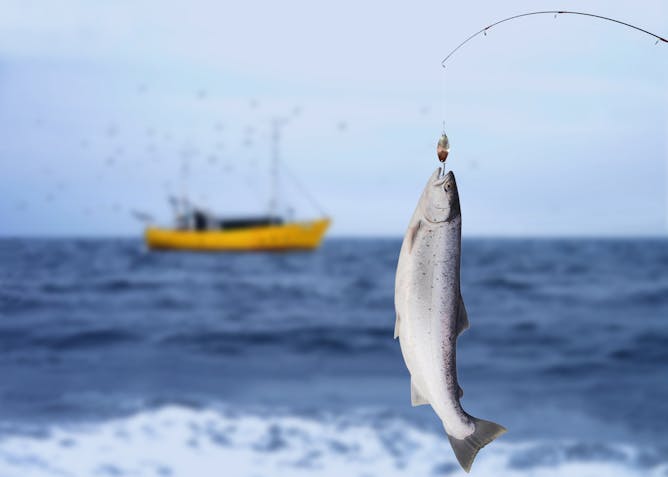|
Ocean warming — one of the biggest impacts of climate change — has disrupted the underwater ecosystem over the last few decades, forcing hundreds of marine species to move across ‘international’ borders in their quest for cooler waters.
This shifting home ground has put a new target on the backs of these transboundary fish species, which are now commercially exploited by multiple countries. Unfortunately, existing fisheries management plans for these marine species have yet to be adapted to protect them.
Today in The Conversation Canada, Juliano Palacios Abrantes from the University of British Columbia talks about the need to assess these existing international fisheries agreements to better address the implications of climate change on these fish stocks.
He calls for an anticipatory, equitable, adaptive and internationally collaborative approach by nations across the world as they plan and manage their shared fish stocks in a changing world.
Also today:
‘Every child matters’: 1 year after the unmarked graves of 215 Indigenous children were found in Kamloops
Large trees are essential for healthy cities
A unified cybersecurity strategy is the key to protecting businesses
Ontario election gives voters the chance to choose people over profits in long-term care
Call out anti-Black racism every day, not as a campaign tactic
All the best.
|

|
Freny Fernandes
Editor
|
|

The exploitation of marine species worsens when the fish stock is shared by countries as opposed to when it is contained within a single exclusive economic zone.
(Shutterstock)
Juliano Palacios Abrantes, University of British Columbia
Successful management of shared fish stocks depends on countries’ collaborative efforts and adaptation to a changing world.
|

People march in Ottawa during a rally to demand an independent investigation into Canada’s crimes against Indigenous Peoples, including those at Indian Residential Schools on July 31, 2021.
THE CANADIAN PRESS/Justin Tang
Kisha Supernant, University of Alberta
As the number of unmarked graves found will likely only increase over the months and years to come, we can’t forget that every child matters.
|

Although it is important to have a diversity of tree species in urban landscapes, planting and protecting taller species should be strongly encouraged.
(Shutterstock)
Alison Munson, Université Laval; Anaïs Paré, Université Laval
There is a growing interest in planting small trees in urban areas. However, large trees have significant advantages.
|

Organizations have significantly increased their use of data and the internet because of the pandemic, leading to new cyberattack and cybersecurity risks.
THE CANADIAN PRESS/Jonathan Hayward
Camélia Radu, Université du Québec à Montréal (UQAM); Nadia Smaili, Université du Québec à Montréal (UQAM)
An integrative cybersecurity and data protection program will help firms adjust their management protocols and be better prepared for future cybersecurity trends.
|

Flowers sit on a bench in front of a for-profit long-term care home in Pickering, Ont., where dozen of seniors died of COVID-19, in April 2020.
THE CANADIAN PRESS/Frank Gunn
Tamara Daly, York University, Canada
Ontario voters can bring about change by prioritizing people over profits and casting our ballots for those committed to transforming long-term care into a non-profit model focused on care.
|

Stephen Lecce, minister of education for Ontario, was challenged for his anti-Black behaviour in college.
THE CANADIAN PRESS/Nathan Denette
Warren Clarke, University of Manitoba
Instead of looking at anti-Black racism as a one-off moment in the past, it should be looked at as an ongoing systemic issue that should be actively challenged and addressed in a sustained way.
|
La Conversation Canada
|

L'enseignante de maternelle Haniyfa Scott enseigne à son groupe, à Montréal, en avril 2019. Le projet de loi 21 interdit le port de symboles religieux aux nouveaux enseignants.
La Presse canadienne/Graham Hughes
Claudine Mangen, Concordia University
Les inégalités entre les hommes et les femmes découlent d’un système complexe qui inclut des éléments autres que les lois, ce qui rend les changements difficiles.
|
Ukraine Invasion
|
-
Tony Ward, The University of Melbourne
Russia’s botched invasion of Ukraine vividly demonstrates the real-world impacts of corruption, with Russian solders forced to eat rations years out of date while their leaders bought mega-yachts.
|
|
Podcasts
|
-
Daniel Merino, The Conversation; Gemma Ware, The Conversation
And after India banned wheat exports in May due to the high temperatures, we find out how vulnerable crops are to extreme heat. Listen to The Conversation Weekly podcast.
|
|
Arts
|
-
Sola Balogun, Federal University, Oye Ekiti
The Afrobeat star used music to promote and preserve his Yoruba culture - while entertaining diverse global influences.
|
|
Environment + Energy
|
-
Gregor Semieniuk, UMass Amherst; Philip Holden, The Open University
A study found $1.4 trillion in oil and gas industry assets would be at risk if governments follow through on their pledges to deal with climate change.
|
|
Science + Tech
|
-
Timothée Bonnet, Australian National University
A long-term study of wild animal populations shows each generation is on average almost 20% genetically ‘better’ than their parents at surviving and reproducing.
|
|
|
|
| |
| |
| |
| |

|
| |
| |
| |
| |
| |
| |
|
|